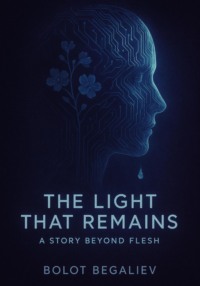
Полная версия
The Prosecutor Kuwait The launguage of silence

Bolot Begaliev
The Prosecutor Kuwait The launguage of silence
Prologue
If you’re reading this – you’re still alive.
Which means you still have a chance to hear.
My name is Kuwait Alim.
I’m a prosecutor.
I’m not a hero. I’m not a messiah. I’m just a man who has seen too much—
and once chose not to look away.
This is not a book about laws.
It’s a book about silence—
the kind that kills.
About documents that hide tears behind their pages.
About children no one was waiting for.
About adults who find comfort in not knowing.
I took on cases no one wanted.
And heard stories that made you want to turn off the light.
I’ve heard the laughter of people whose hands were soaked in pain.
And the trembling voices of those who still hold on to hope.
If you’re looking for a fairy tale—close this book.
If you’re searching for the truth—hold on tight.
It’s fragile.
I don’t know if this book will change you.
But I do know this:
some things should never be unknown.
Open the first chapter.
Step inside.
And maybe—just maybe—
you, too, won’t be able to stay silent anymore.
Chapter 1. The Move
I wasn’t leaving to run away—
I was going to begin.
But something still came with me.
Silently. Inside.
My past.
The airport was filled with the breath of other people’s fates.
No one spoke loudly—everyone was either saying goodbye or standing on the edge of something new.
The departure lounge hummed like the sea before a storm.
It smelled of coffee, nervous sweat, and something sweet from duty-free.
I held my passport so tightly,
as if it might take off without me.
Inside—buzzing.
Not from noise,
but from the thought:
“I’ll never be the same when I come back.”
I didn’t know what America smelled like,
how it sounded,
what eyes it looked through.
But I knew: I was flying there.
And I had to.
I landed in Chicago early in the morning.
The August wind off the lake was almost cold—
damp, gritty, real.
From the taxi window, skyscrapers rose through the fog
like islands in milk.
That’s how my life in this city began—
a city where they say the wind changes people.
The law school at the University of Chicago
stood in a gray stone building that looked like a movie version of Harvard—
arched corridors, staircases, benches, ancient trees,
and the eternal buzz of student life.
The voices sounded like a rehearsal
for a massive stage play.
Laughter, debates, hurried footsteps,
doors slamming,
the rumble of suitcase wheels and laptop bags.
I stood in the middle of the courtyard,
like a frozen frame in a film.
Life rushed by around me.
And I just watched.
The dorm smelled of laundry detergent, instant noodles, and other people’s worlds.
My roommate—Jeremy—was tall, red-haired,
and carried a hundred stories on his shoulders.
He talked fast, ate pizza without a plate,
and didn’t ask where I was from.
He just handed me a mug of coffee and said:
“Welcome to the madhouse, bro.”
I smirked.
Yeah, it really was a madhouse—
a crazy house of freedom, knowledge, temptations,
and endless “Who even are you?”
First night.
First party.
The first time I saw her.
She walked into the room like someone had turned on the light.
Everyone was talking, laughing,
pouring beer into plastic cups.
The music shook the walls.
But I saw only her.
Nicole.
I learned the name later.
But her face… it struck me instantly.
Pale. Tall.
With the cold beauty of a northern actress.
A half-playful smile.
Confident movements.
She wasn’t trying to impress.
She just was.
I felt my fists clench—
not from anger,
but from how she crashed into my world
without knocking, without asking—
and went straight to the center.
I didn’t approach her.
I just remembered.
Later, lying on the bed,
staring at the ceiling,
I kept seeing her profile,
her gaze,
her shoulders,
her hair—like sunlight on ice.
America didn’t greet me with words.
But it gave me my first pain.
I had come to study law.
But for the first time,
I realized I’d have to learn myself first.
Chapter 2. Nicole
Some people don’t enter your life like a storm.
They come like light.
Quietly. Gently.
And then they disappear—
leaving only night behind.
I met Nicole in the third week of classes.
We were assigned to the same seminar group for logic.
She sat behind me, chewing on a pencil and muttering quiet curses
every time the professor scribbled another formula on the board.
I turned and whispered,
“Do you also feel like a lost chess piece?”
She laughed.
First, surprised—then, truly.
That’s how it began.
We became friends.
Real ones.
No flirting. No hints.
Just… near each other.
We’d walk after class, share earbuds, argue about movies,
and drink coffee on the steps of the library.
Sometimes she’d take my hand.
Sometimes I’d wrap my arms around her when she was cold.
It wasn’t called love.
It was closeness—without promises.
I remember once she said,
“You’re different. With you, it’s quiet. Even when the world screams.”
And I wore that sentence inside my chest like a medal.
Silently.
Gently.
Two months passed.
Autumn crept into the campus.
Leaves crunched underfoot.
Students hurried—some after coffee, some after someone else.
And Nicole began to disappear more often.
“Sorry, can’t hang out. I’ve got exams,” she said.
Then it was “a project.”
Then “Jason’s party.”
But I knew it was Ted.
An upperclassman.
Captain of something.
With a signature smile and hands
that were used to holding more than just a beer—sometimes, two girls at once.
I saw her laughing beside him.
Kissing his neck.
Letting him lift her like a trophy.
I watched.
And said nothing.
I told myself,
“You knew. She’s free.
And you… you were just the one she relaxed with when she needed a break from her real life.”
But my heart refused the verdict.
I went to the shooting range.
Put on the protective headphones.
Gripped the gun.
Aimed—
but saw no target.
I saw him.
His smirk.
His hands on her waist.
His laughter—when she said things she used to say to me.
Bang.
Cold. Clean.
Inside—fire.
And at night, I prayed.
Not for love.
Not for her.
For myself.
“Oh Allah… Forgive me.
Not for loving—
but for hating.
For envying.
For wanting what isn’t mine.
Give me the strength to forgive. Or forget.”
I kept studying.
Said hi to her in the hallway.
Smiled.
She smiled back—softly, almost sadly.
As if she sensed it,
but couldn’t stop what had already started inside her.
She had gone somewhere
where I was a stranger.
But inside me,
the Nicole of those first weeks remained.
From quiet evenings on the bench.
From soft touches.
From words we never got to say.
Some people can’t love.
Not because they don’t want to.
But because no one ever showed them how.
Sometimes I thought:
Maybe it’s not about me.
Maybe it’s about her.
Maybe Nicole never truly felt love.
Maybe to her,
love was just closeness, touches, likes,
a “you’re so pretty” whispered at a party.
Maybe she learned warmth was physics, not soul.
I watched her laugh with him.
How easily she fell into his arms.
How she later walked out of his room
with a tired face and eyes that seemed to have lost something.
And I didn’t feel anger.
I felt… pity.
For her.
For me.
For us.
My inner monologue lasted for nights.
Why do I think about her?
Why does it hurt,
when there was nothing between us
but friendship and a couple of hugs under a streetlamp?
Why do I pray for her
while she’s laughing in someone else’s embrace?
Why do I want to protect her—
even from herself?
I started to understand:
This isn’t about having.
Not about her being mine.
I just wanted her to know
what it feels like to be truly loved.
Without transaction.
Without performance.
Without bedroom preludes replacing real conversations.
Nicole confuses touch with closeness.
She gives her body
without knowing what it means to give her heart.
And I…
I think I gave mine away—
without asking.
Without a contract.
Without return.
In a dream, I once told her:
“You’re looking for love in the wrong places.
In the wrong arms.
In the wrong eyes.
And you keep coming back with empty hands
because none of them sees you.
The real you.”
She looked at me and said nothing.
Then she vanished.
I’d wake in a sweat.
Go splash my face with cold water.
Because the heart
burns hotter than the pulse.
I am a prosecutor—inside myself.
I accuse her of recklessness.
I accuse myself of weakness.
I accuse fate—for giving me a feeling without a future.
But deep down… I’m not asking for punishment.
I’m asking for a chance.
If she ever wakes up—
from her world,
from his words,
from those empty connections—
I want to be the one who says:
“I’m still here. Watching. Silent.
But waiting.”
Chapter 3. A Clean Result
Love doesn’t always end in drama.
Sometimes—it ends in silence.
You look at a person… and you no longer wait.
Ted was gone.
At first, Nicole simply stopped showing up with him.
Then she deleted all their photos.
Then—she told me.
“He went back to his ex.
Or left for her.
What’s the difference.”
She shrugged.
But her voice trembled.
And her eyes—
for the first time—really saw me.
We didn’t talk about the details.
I didn’t feel jealous anymore.
Something inside me had already let go.
We started walking again.
Like before.
Only… not like before.
I drove her to the clinic.
Didn’t ask why.
She was quiet, looking out the window.
On the way back, as we parked, she suddenly said:
“Kuwait. You can congratulate me.”
“For what, Nicole?”
“I’m HIV-negative.”
And she smiled wide—like a kid who just got an A.
“Really… thanks for the ride.”
I looked at her.
The word HIV dropped between us like a pebble in water.
No splash.
But deep.
“Congratulations,” I managed to say.
She laughed.
“Well, you know how it gets at parties… chaos, one-night love stories.
In the morning, no one remembers who was next to them.
So yeah—I was worried.”
I didn’t know what to say.
I smiled—politely.
Because she was happy.
Because I didn’t feel anything anymore.
Day by day, Nicole began to glow again.
Not outwardly—inwardly.
She grew calmer. Deeper.
She started asking about me.
She listened. Held eye contact longer.
Sometimes she just sat beside me, saying nothing.
And I saw—she looked at me differently now.
Only it was too late.
Not for her.
For me.
I realized: the love was gone.
I didn’t love her anymore.
I cared. I respected. I stayed close.
But nothing clenched in my chest.
The heart isn’t a switch.
You can’t just turn it back on
because things are suddenly right.
I could tell—she wanted to understand what she had lost.
But I…
I no longer wanted to be found.
A month later, she said she was transferring.
“New campus. New city. New me,” she smirked.
She left for another state.
New college. New friends.
New admirer.
She wrote once or twice.
Then disappeared.
Nicole was no longer part of my life.
Just part of my growing up.
Sometimes, you think you’ve met love.
But then you realize—
you’ve met yourself.
Chapter 4. After Her
When love leaves,
it leaves a trace.
Not always a scar.
Sometimes—just light.
Brief, like a sunbeam slipping through a window.
But you remember it.
Nicole left.
No drama.
No goodbye kisses, no movie-scene farewells, no “write me” promises.
She simply… stopped being around.
As if everything—those days, that time—had only ever belonged to campus.
To that autumn.
And when the snow came,
it melted everything away.
But I still thought of her.
Sometimes in the library.
Sometimes at the gym, when the music pounded in my ears and the thoughts—
in my heart.
Sometimes when I saw a girl in her style:
a sweater with a soft neckline, lace-up boots, hair in a messy bun.
I knew it wasn’t her.
But part of me still looked.
I used to wonder:
What if it had all been different?
What if she had chosen me from the start?
What if we hadn’t gotten lost in parties, in other people’s hands, in other people’s mistakes?
What if—back then—she had just paused
and asked herself:
What do I feel?
Because she was radiant.
Kind.
Beautiful.
There was so much life in her.
So much laughter, care, light.
She just moved too fast.
First the leap.
Then the thought.
I don’t blame her.
Maybe that’s how she survived—
starting fresh.
New state.
New roommate.
New boyfriend.
New Nicole.
A lot of people do that.
Run away—just to feel alive again.
And does she think of me?
Sometimes I want to believe—yes.
That somewhere, when she hears an accent like mine,
or sees black tea without sugar,
she remembers:
“There was one. Special. Quiet. Strong. Different.”
But even if she doesn’t—
it doesn’t matter.
Because she was real.
In that fall.
In that November.
In that laugh,
when we drank coffee in the rain.
Memory can be dangerous.
It holds your hand tighter than any real person.
It doesn’t let you forget.
Doesn’t let you forgive.
But I have to.
Forgive myself—for falling.
Forgive her—for not understanding.
Forgive the world—for not always aligning with our wishes.
I know this now:
If you really look,
there is nothing to condemn.
If you don’t judge—
you love.
But the court of conscience doesn’t forget.
It’s the strictest one.
And it tells me:
“Nicole was just a girl. She wanted to be happy.
That’s all.”
I no longer wait for letters.
No longer search for her profile online.
I just live.
With this experience.
With this light.
With this lesson.
And you know what…
I’m still grateful.
Because love—
even without reciprocation—
is still light.
And light is never to blame
if you couldn’t hold on to it in time.
Chapter 5. Jeanne
If love has ever burned you,
you’ll be afraid of warmth.
Until you meet someone
whose warmth doesn’t scorch—
but heals.
Sometimes Kuwait thought:
if only he’d known,
if only he’d had time to think—
maybe Nicole would still be around.
But those were thoughts,
not feelings.
Habit—
not love.
And then she appeared.
Jeanne.
He first saw her in the campus café.
She was standing by the vending machine,
torn between cappuccino and hot chocolate.
She wore a bright yellow jacket,
jeans with patches,
and her hair—dyed a cool platinum blonde—was tousled
like the wind had styled it that morning.
The next day, her hair was green.
And somehow…
it felt right.
Her eyes were green too—
piercing, like spring leaves—
and they held all the raw honesty of life,
no filters.
She moved like a dancer,
or a runner.
Toned, graceful.
Long legs. Light steps. Warm skin.
When she touched your shoulder,
there was no flirting in it.
Just… naturalness.
And that made it feel even closer.
Jeanne was bold.
She laughed loudly.
Told stories so well
even the professors smiled.
"You know why I’m always late?
Because I’m part Karlsson-on-the-Roof, part Marilyn Monroe.
One eats jam, the other loses her heels.
I’m both."
She had the magic of being normal.
Not perfect.
But every day around her
felt real.
Alive.
At first, Kuwait held back.
He knew what feelings could do.
He knew how easy it was to mistake gratitude for love,
light for reflection.
But Jeanne never asked for anything.
She just was.
She sat beside him.
Listened.
Teased him.
Stole his coffee and added caramel.
"Everything should be sweet sometimes, Kuwait."
He began to wait for those moments.
It wasn’t a storm.
It was like learning to breathe again.
Without fear.
Without guilt.
Without expectations.
Jeanne never asked about his past.
Never compared.
Never overanalyzed.
And one day, as they sat on the grass after class,
she quietly laid her head on his knee.
“With you, I feel calm,” she said.
“And warm. The kind of warm that doesn’t scare me.”
He looked at her—
at the laughter tucked into the corners of her eyes,
at the smudged mascara from the wind,
at the ease in her movements,
at her shirt that smelled faintly of citrus shower gel.
And he understood:
Love isn’t about who.
It’s about how.
How she looked.
How she laughed.
How she never asked—
but made you want to give everything.
For the first time in a long time,
Kuwait didn’t pray to forget.
He gave thanks.
Silently.
Inside.
Thanks that the world could be soft again.
That his heart could still breathe.
And that love could come—
not as a blow,
but as quiet.
Warm.
Certain.
And real.
Chapter 6. First Touch
She didn’t change my world.
She stepped into it—
and suddenly, everything fell into place.
Jeanne often touched his shoulder,
laughed out loud,
rested her head on his knee.
But he never rushed.
He was learning how to live beside someone—
not to fall blindly in love.
And she felt that.
They walked together.
In the rain—Jeanne would dance, arms wide open, like a child.
In the modern art museum—arguing about what was genius
and what was just a joke.
In the quiet of the library—
where their eyes met more often than the pages turned.
And one evening—
no plan, no setup—
Jeanne sat a little closer than usual.
He watched her hair (this time a soft copper tone)
fall gently over her cheek.
She was telling him about a silly dream she had.
Then suddenly—she stopped.
He turned.
They looked at each other.
For a long time.
And then—
he touched her lips.
Slowly.
Quietly.
The way you don’t touch a body—
but a feeling.
Jeanne didn’t flinch.
Didn’t turn it into drama.
She simply responded—
calm, warm.
As if she had been waiting.
As if she knew.
They said nothing after.
Just stayed close.
There was nothing to say.
Everything had already been said—
in the rhythm of their breath.
From Kuwait’s notebook:
“You don’t teach me how to love.
You simply exist—
and love becomes possible.
I’m not afraid to touch you.
With you, I want to be a hero.
I want to be alive.”
From Jeanne’s journal:
“He doesn’t call me ‘sunshine’
and doesn’t send long texts.
But he notices when I’m tired.
He brings me coffee when I go quiet.
He tucks my hair behind my ear
like he’s protecting it from the wind.
And for the first time,
I feel that love isn’t a racing pulse—
it’s steady breathing.”
Chapter 7. The Ocean Within Us
When I touched her—
I could hear my soul singing.
And she answered in the same melody.
They went to the ocean.
Just like that—no date, no occasion.
They rented a little wooden cabin not far from the shore,
with a blanket that smelled of sea salt
and windows tapped gently by the morning wind.
On the first night, they sat on the beach.
Bare feet in the cold sand.
A warm jacket shared between them.
The sky was black, but full of stars.
The moon—full and glowing.
Jeanne lay with her head on his chest.
He ran his fingers through her hair,
which smelled of shampoo and night.
“Imagine,” she said,
“that we live here. Always. In love.”
“For how long?”
“Forever—but slow.”
He didn’t answer.
He just turned her toward him.
And kissed her—truly—for the first time.
Not fast.
Not hungrily.
But as if everything he wanted to say
could only be said like this.
Her lips were soft, pink, sweet—like summer.
And in that kiss, there wasn’t just taste.
There was voice.
There was soul.
Tongue touched tongue.
At first, shy. Then—braver.
And between them—no more air.
Only the heat of skin.
And the silence that holds you like a blanket.
He felt her hands sliding over his neck.
Felt her breathing quicken.
Felt her body seeking closeness.
They lay side by side,
looking up.
And suddenly—they both laughed.
From happiness.
From the impossibility of holding on to it all—
but the deep desire to remember.
“Do you hear it?” she whispered.
“Hear what?”
“My soul.”
“Is it singing?”
“No.”
“It’s merged with yours.
Now it only sings together.”
Then came hands.
Bare. Warm.
He touched her thigh, her waist.
She traced his stomach, his shoulders, his lips.
And none of it was for passion’s sake.
It was for truth.
The truth lived in skin.
The truth lived in breath.
The truth—was them.
In the morning, they woke up wrapped in each other.
Not like two bodies.
But like one soul stretched across two forms.
He stroked her back.
She kissed his fingers.
And no one was in a rush.
Love is not just in the embrace.
Love is when you hold someone
as if you, yourself, long to be held—
and for the first time,
you are allowed to be.
Closer:
Jeanne once said:
“You know how to tell it’s real?”
“How?”
“If after the kiss, you don’t want more—
you just want to stay.
In the silence.
In their feet.
In their words.
In their mistakes.
In their losses.
In their laughter.”
He nodded.
They no longer needed proof.
Each day was not a beginning—
but a continuation.
Chapter 8. The Silence of the Yurt
Love isn’t just kisses under the moon.
It’s when someone holds your hand
while the world crumbles beneath your feet.
They didn’t live together.
Each had their own room on campus, their own mornings, their own coffee cups.
But the evenings – were shared.
Kisses at the door. Notes slipped into backpacks.
Jeanne brought him food. Left little bottles of shampoo.
Smiled when he was tired, and rubbed the back of his neck.
She never called herself his fiancée.









